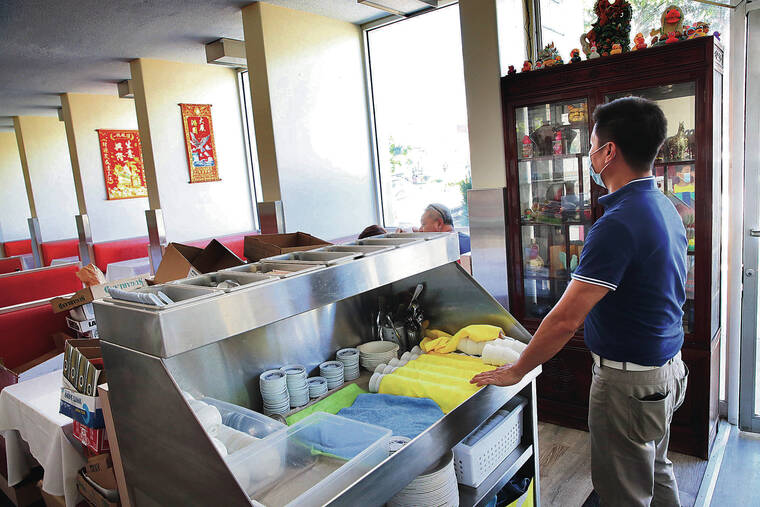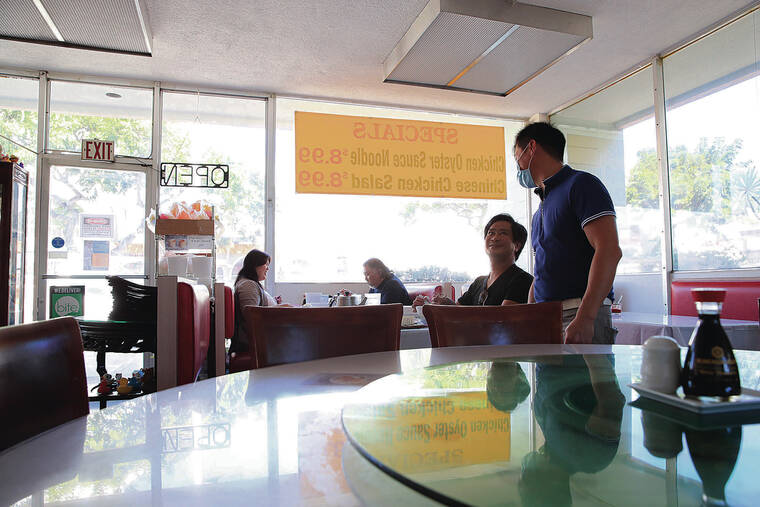A new Hawaii Restaurant Association survey suggests that industry revenue declines in the past two months were worse than anticipated, prompting a renewed call to lift seating capacity limits.
The trade association Friday released results of a member poll taken earlier this week showing that 37% of restaurant owners surveyed said their revenue dropped by more than half in September and most of October compared with the same period last year or the prior two months.
An even greater share, 80% of respondents, reported a sales decline of at least 30%.
The results were based on responses from 192 restaurant owners, some of whom operate more than one eatery, and show that revenue declines overall were higher than what the same owners expected when surveyed in early September.
Association leaders said it’s time to end seating capacity limits.
“As daily case counts are coming down and our statewide population is over 70% vaccinated, the HRA is advocating for restaurants a return to full capacity indoors and open outdoor seating,” the association said in a statement. “We are 19 months into the pandemic and restaurants face sustained challenges from lower foot traffic, inflation, and the ongoing labor shortage.”
On Wednesday, Honolulu Mayor Rick Blangiardi said state officials have agreed to allow more gathering at indoor and outdoor activities on Oahu, including sporting events and weddings, but not at restaurants, where a 50% capacity limit will stay in place.
“We are asking for (full) capacity,” Blangiardi said. “That is a decision that we cannot make without the governor’s approval. We’re hoping to get that. We lobbied very hard for that.”
The mayor noted that the restaurant industry is an important part of the state’s economic recovery, given that it normally provides jobs for over 100,000 people and generates $6.5 billion in annual spending. Blangiardi also said it is part of how people live. “They play a big role and we’re cheering for them,” he said.
Besides the seating capacity limit, another thing hurting many restaurants over the past two months has been depressed visitor arrivals triggered by Gov. David Ige’s Aug. 23 public plea for tourists to stay away through the end of this month.
One other major negative factor, according to some restaurateurs, has been a requirement that dine-in customers over the age of 12 show a vaccination card or negative COVID-19 test taken within 48 hours.
Man Bong Ching, manager of the Japanese restaurant Sakura Terrace in Moiliili, said the business, already hurt by the capacity limit, switched to takeout- only service Sept. 21 because of the city’s vaccine verification or test requirement that went into effect Sept. 13. “Sales are down by two-thirds,” he said. “Only one-third is left.”
Ching said Sakura Terrace plans to resume dine-in business Nov. 16 and is hopeful that the capacity limit and a requirement that groups be spaced at least 6 feet apart are lifted.
Aaron Fong, owner of Golden Duck Chinese Restaurant, said sales at his two locations in Moiliili and Kailua have been down 50% since early 2020. He believes that his business, which is 99% kamaaina, remains depressed partly because of the requirement to show a vaccine card or negative coronavirus test. This requirement, he estimates, is a 20% drag. “For a restaurant, that’s a lot,” he said.
Blangiardi said the vaccine or test requirement, which is part of the city’s Safe Access O‘ahu program, will remain in place until at least Christmas. He said it has helped increase vaccination rates and restaurant sales.
The restaurant association supports Safe Access O‘ahu, though the survey did not shed light on the impact from it on restaurants as perceived by owners.
The survey, however, did show a big divide among restaurant owners over employee and customer vaccination mandates.
Survey results showed that 58% of respondents believe customers would feel safer if all employees were vaccinated.
About 20% of restaurant owners in the survey reported employee vaccination rates under 70%.
The survey also said 65% of respondents believe employees would feel safer knowing that co-workers were vaccinated, and that 59% believe employees would feel safer if guests had to be vaccinated.
Bryan Andaya, chief operating officer of plate lunch chain L&L Hawaii, warned that restaurants in the state are in danger of joining many that have already succumbed to coronavirus impacts.
“Restaurants are still standing on their last leg, and with federal stimulus drying up, we’ll need to see foot traffic come back soon to prevent another round of industry- wide closures and layoffs,” he said in a statement.




